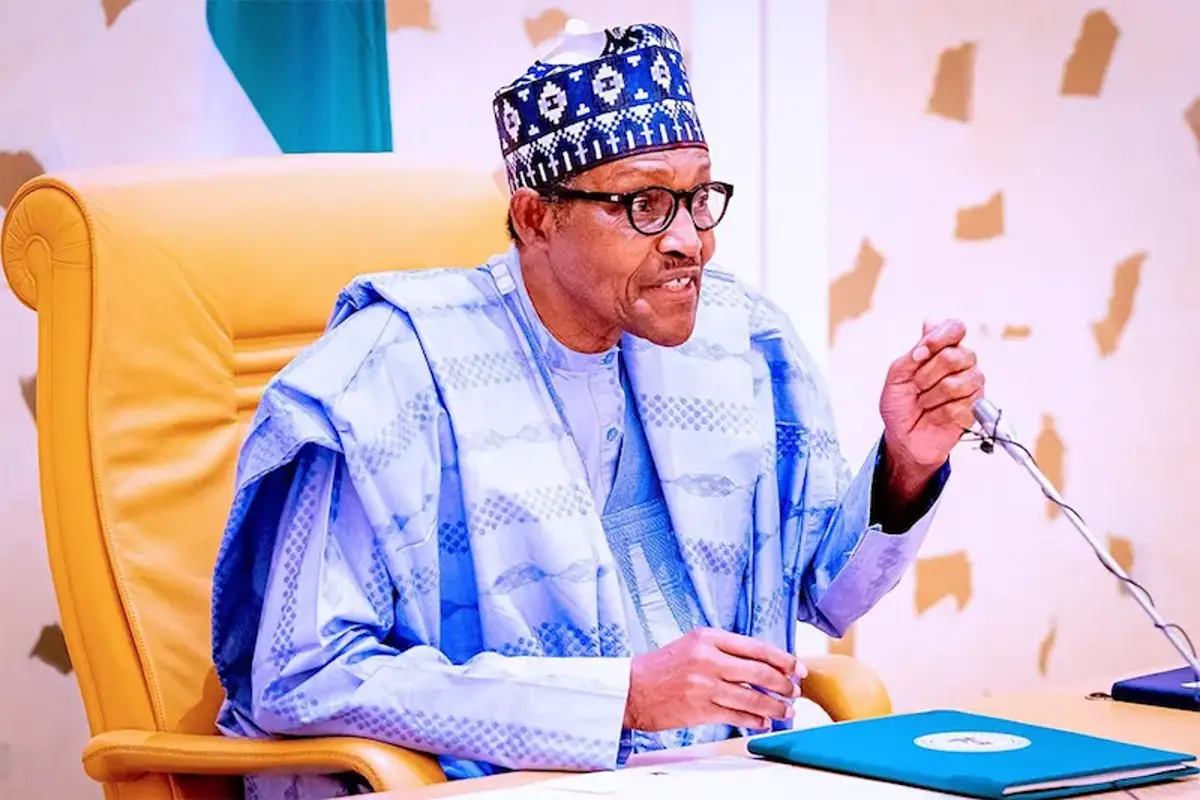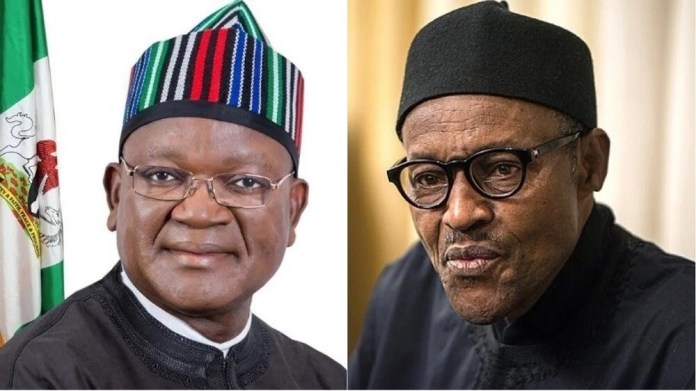Headlines
Buhari Signs Three Bills to Fight Terrorism, Money Laundering, Other Financial Crimes into Law

By Derrick Bangura
President Muhammadu Buhari has signed into law, three bills aimed at improving the anti-money laundering and counter terrorist financing/proliferation frameworks in the country.
The bills signed Thursday were the Money Laundering (Prevention and Prohibition) Bill, 2022, the Terrorism (Prevention and Prohibition) Bill, 2022, and the Proceeds of Crime (Recovery and Management) Bill, 2022.
Speaking at a brief signing ceremony at the Council Chamber at the State House, Abuja, the president described the bills as being in tandem with his administration’s commitment to fight corruption and illicit financing activities, as well as critical to the governance agenda and the development of Nigeria.
According to him, the new laws have provided enough punitive measures and containment strategies against abuses and compromises while the inadequacy of all the repealed Acts had impacted legal actions against offender.
“We will not rest until we rid the nation of the menace of money laundering, terrorism, and other financial crimes,” he added.
Buhari commended the National Assembly members for their tenacity, courage and commitment in ensuring that Nigeria put in place effective measures to address the menace of money laundering, terrorism, and terrorism financing.
He noted that the 9th National Assembly had proven to be patriotic, responsive, resourceful and industrious in its legislative assignments, recalling that he had on January 14, 2022, sought expeditious passage of the three bills.
The president lauded the Assembly under Senate President, Dr Ahmed Lawan and House Speaker, Hon Femi Gbajabiamila and their colleagues for responding to his request, saying they have certainly carved out a worthy legacy for themselves.
Commenting on the importance of the legislations, the president said: “The signing of these bills into law today not only strengthens the Anti-Money Laundering/Combating the Financing of Terrorism (AML/CFT) framework in the Country, but addresses the deficiencies identified in Nigeria’s 2nd round of Mutual Evaluation as assessed by Inter-Governmental Action Group Against Money Laundering in West Africa on compliance with the Financial Action Task Force global standards.
“Accordingly, the repeal of the Money Laundering (Prohibition) Act, 2011 as amended and enactment of Money Laundering (Prevention and Prohibition) Act, 2022 provides comprehensive legal and Institutional Framework for the prevention and prohibition of money laundering in Nigeria and confers on the Economic and Financial Crimes Commission, the legal status of the Special Control Unit Against Money Laundering.
“The repeal of the Terrorism (Prevention) Act, 2011 as amended in 2013, and enactment of the Terrorism Prevention and Prohibition) Act, 2022 provides for the effective implementation of international instruments on the prevention and combating of terrorism and suppression of the financing of terrorism.
“The enactment of the Proceeds of Crime (recovery and Management) Act, 2022 makes comprehensive provisions for the seizure, confiscation, forfeiture and management of properties derived from unlawful activity.”
Buhari told his audience which included the Senate President and some Senators, the Minister of Justice and Attorney-General of the Federation, Abubakar Malami, Heads of anti-corruption agencies, including ICPC and EFCC, that the executive arm of government carefully avoided creating another asset recovery and management agency with its cost implications in deference to government’s sensitivity to the rising cost of governance.
He explained that the new law mandates the creation of dedicated accounts for the proceeds of crime and other confiscated assets in order to enhance the accountability of the process.
The president stressed: “I have therefore taken time to note the emphasis placed on collaboration, synergy and unification of strategies and measures to combat the scourge of Money Laundering and terrorism financing and proliferation financing in the Act.
“The primary objectives of these measures are to ensure effective, unified and comprehensive legal, regulatory and institutional framework for the implementation of the Acts.
“This is profound and calls for coordinated responses to the challenges posed by the menace. I therefore charge all relevant agencies to ensure effective implementation of these new laws.
“The robust frameworks diligently enshrined in the Acts can only serve useful purposes when every bit of them is enforced.
Emphasising that the fight against corruption requires an “All of Government, All of Nation approach,” the president affirmed that every Nigerian had a role to play to rid the country of corrupt practices.
He commended the members of the National Action Task Force comprising several Ministries, Departments and Agencies of Government, noting that the bills were clear demonstration of government functioning at its best with coordination, collaboration, and execution all towards a common goal.
The president assured Nigerians that his administration would continue to do its best to secure the nation, adding that the bills signed into law represent not just legislative instruments but very significant governmental actions projecting courage, determination, and sincerity in tackling the menace of Money laundering, terrorism and other financial crimes.
Meanwhile, the federal government yesterday said it was already winning the war against bandits and terrorists, noting that Nigerians are only experiencing occasional flashes of attacks on soft targets.
According to the government, the number of bandits and terrorist attacks was decreasing, saying more criminals were being apprehended.
These claims were made by the Minister of Interior, Rauf Aregbesola, at the launch of the Nigeria Internal Security and Public Safety Alert System (N-Alerts), held yesterday in Abuja.
“The good news is that government is winning. The government has committed and continues to commit (an) unprecedented amount of resources – human and material – to addressing the security challenges in the country, with personnel and equipment spread thin,” said Aregbesola.
He pointed out that security agencies would have foiled many attacks if communities had notified them in real-time.
“One noticeable lacuna is information and timely alert of the security agencies to incidents of crimes, breach of security and natural disasters before they happen or while they are going on,” the minister stated.
“In most cases, they would have been prevented or mitigated if the alert had come in time. As part of the response to this challenge, the Ministry of Interior has, therefore, developed an application, a technological innovation that works with the smart mobile phone or any other device with Android or IOS capability, to send alerts to all security agencies in real-time.”
The application uses audio-visual and geospatial location identification of the caller and scenes of incidents on the Ministry Inter-Agency Situation Room (MISR) and Command and Control Centres, dashboards of the four services and police headquarters for joint inter-agency operations.
Headlines
Noble Ladies Champion Women’s Financial Independence at Grand Inauguration in Abuja

Women from diverse backgrounds across Nigeria and beyond gathered at the Art and Culture Auditorium, Abuja, for the inauguration and convention of the Noble Ladies Association. The event, led by the association’s Founder and “visionary and polished Queen Mother,” Mrs. Margaret Chigozie Mkpuma, was a colourful display of feminine elegance, empowerment, and ambition.
The highly anticipated gathering, attended by over 700 members and counting, reflected the association’s mission to help women realise their potential while shifting mindsets away from dependency and over-glamorization of the ‘white collar job.’ According to the group, progress can be better achieved through innovation and creativity. “When a woman is able to earn and blossom on her own she has no reason to look at herself as a second fiddle,” the association stated.
One of the association’s standout initiatives is its women-only investment platform, which currently offers a minimum entry of ₦100,000 with a return of ₦130,000 over 30 days—an interest rate of 30 percent. Some members invest as much as ₦1 million, enjoying the same return rate. Mrs. Mkpuma explained that the scheme focuses on women because “women bear the greater brunt of poverty” and the platform seeks “to offer equity in the absence of economic equality.”
Education is also central to the Noble Ladies’ mission, regardless of age. Their mantra, “start again from where you stopped,” encourages women to return to school or upgrade their skills at any stage in life. The association believes that financial stability is vital in protecting women from cultural practices that dispossess widows of their late husbands’ assets, while also enabling them to raise morally and socially grounded families.
Founded on the vision of enhancing women’s skills and achieving financial stability, the association rests on a value system that discourages pity and promotes purpose. “You have a purpose and you build on that purpose to achieve great potentials and emancipation,” Mrs. Mkpuma said.
A criminologist by training and entrepreneur by practice, she cautions against idleness while waiting for formal employment. “There are billions in the informal and non-formal sectors waiting to be made,” she said, rejecting the “new normal of begging” and urging people to “be more introspective to find their purpose in life and hold on to it.”
Mrs. Mkpuma’s management style keeps members actively engaged, focusing on vocational skills and training to prepare them for competitive markets. She is exploring “innovative integration of uncommon technologies” and is already in talks with international franchises to invest in Nigeria, with Noble Ladies as first beneficiaries.
The association’s core values include mutual respect, innovation, forward-thinking, equal opportunity, and financial emancipation. With plans underway to establish a secretariat in the heart of Abuja, the group aims to expand its impact.
The event drew high-profile guests, including former Inspector General of Police, Mike Okiro, and a host of VIPs, marking a significant milestone in the association’s drive for women’s empowerment.
Headlines
NEPZA, FCT agree to create world-class FTZ environment

The Nigeria Export Processing Zones Authority (NEPZA) has stepped in to resolve the dispute between the Federal Capital Territory Administration and the Abuja Technology Village (ATV), a licensed Free Trade Zone, over the potential revocation of the zone’s land title.
Dr. Olufemi Ogunyemi, the Managing Director of NEPZA, urged ATV operators and investors to withdraw the lawsuit filed against the FCT administration immediately to facilitate a roundtable negotiation.
Dr. Ogunyemi delivered the charge during a courtesy visit to the Minister of the Federal Capital Territory, Barrister Nyesom Wike, on Thursday in Abuja.
You will recall that the ATV operators responded to the revocation notice issued by the FCT administration with a lawsuit.
Dr. Ogunyemi stated that the continued support for the growth of the Free Trade Zones Scheme would benefit the nation’s economy and the FCT’s development, emphasizing that the FCT administration recognized the scheme’s potential to accelerate industrialisation.
Dr. Ogunyemi, also the Chief Executive Officer of NEPZA, expressed his delight at the steps taken by the FCT minister to expand the economic frontier of the FCT through the proposed Abuja City Walk (ACW) project.
Dr. Ogunyemi further explained that the Authority was preparing to assess all the 63 licensed Free Trade Zones across the country with the view to vetting their functionality and contributions to the nation’s Foreign Direct Investment and export drives.
“I have come to discuss with His Excellency, the Minister of the Federal Capital Territory on the importance of supporting the ATV to succeed while also promoting the development of the Abuja City Walk project. We must work together to achieve this for the good of our nation,” he said.
On his part, the FCT Minister reiterated his unflinching determination to work towards President Bola Ahmed Tinubu’s Renewed Hope Agenda by bringing FDI to the FCT.
“We must fulfil Mr. President’s promises regarding industrialization, trade, and investment. In this context, the FCT will collaborate with NEPZA to review the future of ATV, a zone that was sponsored and supported by the FCT administration,” Wike said.
Barrister Wike also said that efforts were underway to fast-track the industrialisation process of the territory with the construction of the Abuja City Walk.
The minister further said the Abuja City Walk project was planned to cover over 200 hectares in the Abuja Technology Village corridor along Airport Road.
According to him, the business ecosystem aimed to create a lively, mixed-use urban center with residential, commercial, retail, hospitality, medical, and institutional facilities.
He added that the ACW would turn out to be a high-definition and world-class project that would give this administration’s Renewed Hope Agenda true meaning in the North-Central Region of the country.
Barrister Wike also indicated his continued pursuit of land and property owners who failed to fulfil their obligations to the FCT in his determination to develop the territory.
Headlines
Benue IDPs block highway, demand return to ancestral homes

Vehicular movement along the Yelwata axis of the Benue–Nasarawa highway was brought to a standstill on Wednesday as Internally Displaced Persons, IDPs, staged a protest, demanding immediate return to their ancestral homes.
The protesters, believed to be victims of persistent attacks by suspected herdsmen, blocked both lanes of the busy highway for several hours, chanting “We want to go back home”.
The protest caused disruption, leaving hundreds of motorists and passengers stranded.
Eyewitnesses said the displaced persons, many of whom have spent years in overcrowded IDP camps, are expressing deep frustration over the government’s delay in restoring security to their communities.
“We have suffered enough. We want to return to our homes and farms,” one of the protesters told reporters at the scene.
Security personnel were reportedly deployed to monitor the situation and prevent any escalation, though tensions remained high as of press time.
Efforts to reach the Benue State Emergency Management Agency, SEMA, and other relevant authorities for comment were unsuccessful.
-

 Headlines4 years ago
Headlines4 years agoFacebook, Instagram Temporarily Allow Posts on Ukraine War Calling for Violence Against Invading Russians or Putin’s Death
-

 Headlines4 years ago
Headlines4 years agoNigeria, Other West African Countries Facing Worst Food Crisis in 10 Years, Aid Groups Say
-

 Foreign4 years ago
Foreign4 years agoNew York Consulate installs machines for 10-year passport
-

 News1 year ago
News1 year agoZero Trust Architecture in a Remote World: Securing the New Normal
-

 Entertainment3 years ago
Entertainment3 years agoPhyna emerges winner of Big Brother Naija Season 7
-

 Headlines2 years ago
Headlines2 years agoNigeria Customs modernisation project to check extortion of traders
-

 Entertainment2 years ago
Entertainment2 years agoMovie download platform, Netnaija, announces closure
-

 Economy2 years ago
Economy2 years agoWe generated N30.2 bn revenue in three months – Kano NCS Comptroller













